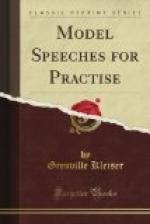I am very glad to be able to thank Lord Coleridge for having, I believe for the first time, coupled the name of the President of the United States with that of her Majesty on an occasion like this. I was struck, both in what he said, and in what our distinguished guest of the evening said, with the frequent recurrence of an adjective which is comparatively new—I mean the word “English-speaking.” We continually hear nowadays of the “English-speaking race,” of the “English-speaking population.” I think this implies, not that we are to forget, not that it would be well for us to forget, that national emulation and that national pride which is implied in the words “Englishman” and “American,” but the word implies that there are certain perennial and abiding sympathies between all men of a common descent and a common language. I am sure, my lord, that all you said with regard to the welcome which our distinguished guest will receive in America is true. His eminent talents as an orator, the dignified—I may say the illustrious—manner in which he has sustained the traditions of that succession of great actors who, from the time of Burbage to his own, have illustrated the English stage, will be as highly appreciated there as here.
And I am sure that I may also say that the chief magistrate of England will be welcomed by the bar of the United States, of which I am an unworthy member, and perhaps will be all the more warmly welcomed that he does not come among them to practise. He will find American law administered—and I think he will agree with me in saying ably administered—by judges who, I am sorry to say, sit without the traditional wig of England. I have heard since I came here friends of mine gravely lament this as something prophetic of the decay which was sure to follow so serious an innovation. I answered with a little story which I remember having heard from my father. He remembered the last clergyman in New England who still continued to wear the wig. At first it became a singularity and at last a monstrosity; and the good doctor concluded to leave it off. But there was one poor woman among his parishioners who lamented this sadly, and waylaying the clergyman as he came out of church she said, “Oh, dear doctor, I have always listened to your sermon with the greatest edification and comfort, but now that the wig is gone all is gone.” I have thought I have seen some signs of encouragement in the faces of my English friends after I have consoled them with this little story.
But I must not allow myself to indulge in any further remarks. There is one virtue, I am sure, in after-dinner oratory, and that is brevity; and as to that I am reminded of a story. The Lord Chief Justice has told you what are the ingredients of after-dinner oratory. They are the joke, the quotation, and the platitude; and the successful platitude, in my judgment, requires a very high order of genius. I believe that I have not given you a quotation, but




